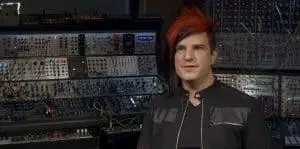
Are you a fan of 90’s industrial band Circle of Dust? Or frontman Klayton’s other projects, Celldweller and Scandroid? If so, you might already have a copy of Full Circle: The Birth, Death & Rebirth of Circle of Dust, the new film about the beginning of Klayton’s career. However, if you, like me, have minimal knowledge of Klayton’s output, there’s no reason to bother with this documentary.
Klayton is a Jason Bateman/Aaron Eckhart facemash with a splashy bright-red hairdo. His three-decade career comprises various shades of industrial and electronic music: heavy-metal riffs, angsty lyrics, drum machines, distorted synths, and lately more digressions into EDM and synthwave. I don’t have anything to say about the music other than it sounds like the Quake II soundtrack to me and isn’t really my thing. He’s got a sizeable following, though, and this documentary had a lot of potential to follow his interesting career trajectory and profile a niche subculture.

“His three-decade career comprises various shades of industrial and electronic music: heavy-metal riffs, angsty lyrics, drum machines, distorted synths…”
Full Circle ended with me knowing more about its subject than I did going in, but it wasn’t the kind of knowledge I wanted. Klayton’s grandfather inspired him to make music. He played in bands as a teenager and learned different instruments. He combined guitar riffs (no way???) with drum programming (holy s**t!!!) and got a record deal. He released some albums. A lot of screen time goes to mundane things that went wrong in Klayton’s early days: the equipment didn’t work during his first studio session. He didn’t like some of his album art. He had too many pseudonyms that marketers didn’t know what to do with. He had technical difficulties at his live shows. His first record deal was a ripoff. Etcetera, etcetera.
In this morass of every-band experiences, we learn next to nothing about Klayton’s artistic growth: nothing about what bands influenced his style, or what themes and cultural touchstones he wanted to engage with. Instead, a revolving door of talking heads (most interviews seem to be conducted by Klayton himself) describes his music with the most boilerplate vocabulary imaginable: hard, raw, aggressive, scary. Full Circle was produced by FiXT, Klayton’s own record label, meaning that it’s less a documentary and more an extended advertisement for Klayton’s back catalogue. There’s nothing wrong with that if you’re a fan, but it seems like everyone involved with Full Circle’s production is a fan or employee of the man himself. There’s nothing here for the rest of us.

“…everyone involved with Full Circle’s production is a fan or employee of the man himself.”
Reading up on Klayton’s career, there’s plenty of drama and conflict that a filmmaker with more independence could have turned into a compelling story. For example, Klayton was raised Christian, and Circle of Dust’s first albums were marketed as Christian music, but he moved away from that label with some controversy. The word “Christian” isn’t uttered once in the film. Same goes for politics: in one song, Circle of Dust sampled Republican vice-presidential nominee Dan Quayle saying “the American people should demand that their president will tell the truth” at the end of his debate with Al Gore. What were/are the politics of Klayton’s fanbase? What was the relationship between the Christian/conservative and mainstream rock music scenes in the 90’s? What were Klayton’s reasons for moving from one to the other?
The answers to those questions would make for a better documentary. But Klayton’s fastidious image control means that nothing interesting or personal really comes up. Full Circle is a music documentary with nothing to say about art or the creative process.
Full Circle: The Birth, Death & Rebirth of Circle of Dust (2018) Directed by James Rhodes. With Klayton, Kurt Bachman, Tyler Bacon, Jon D. Harrison.
4 out of 10 distorted synths


